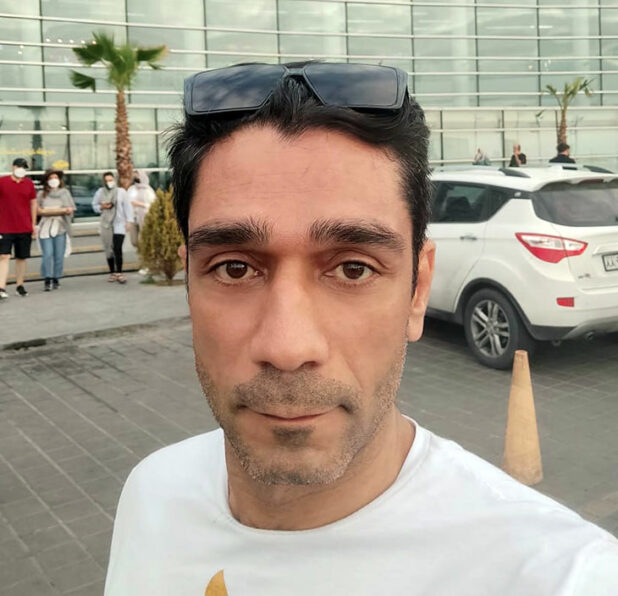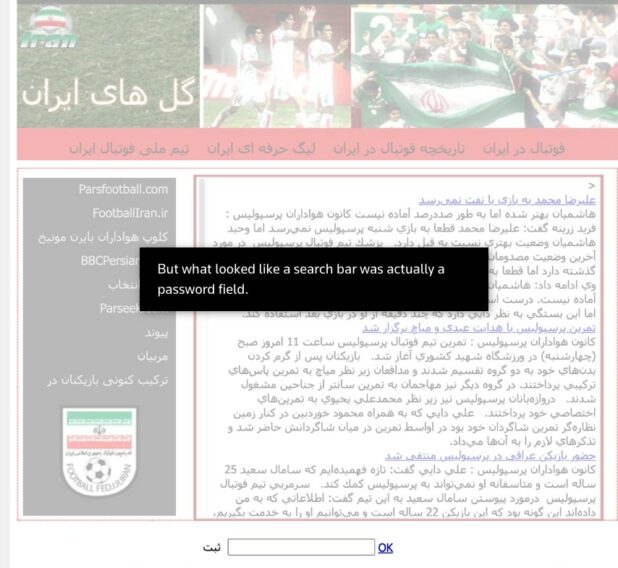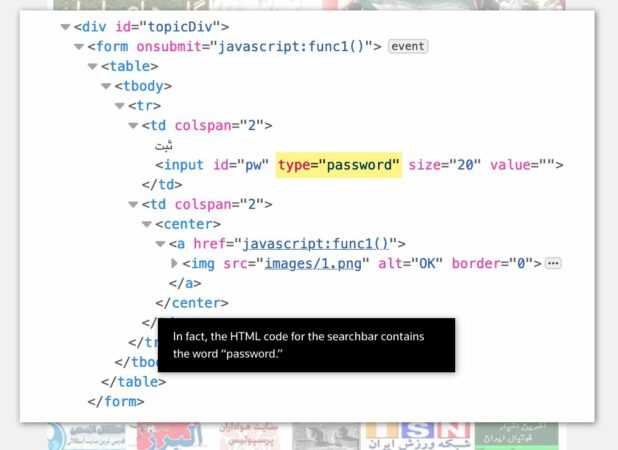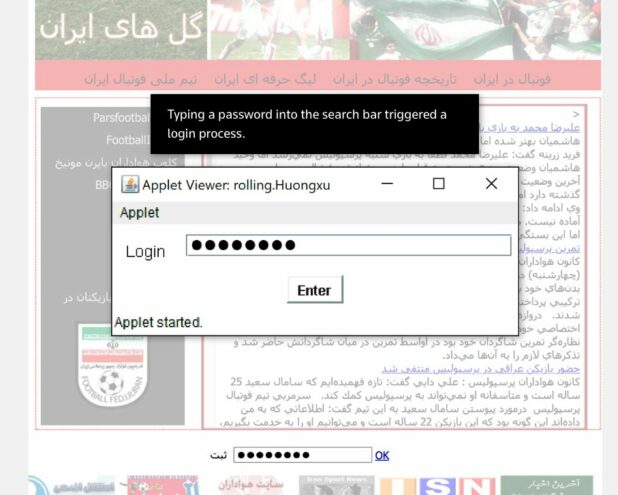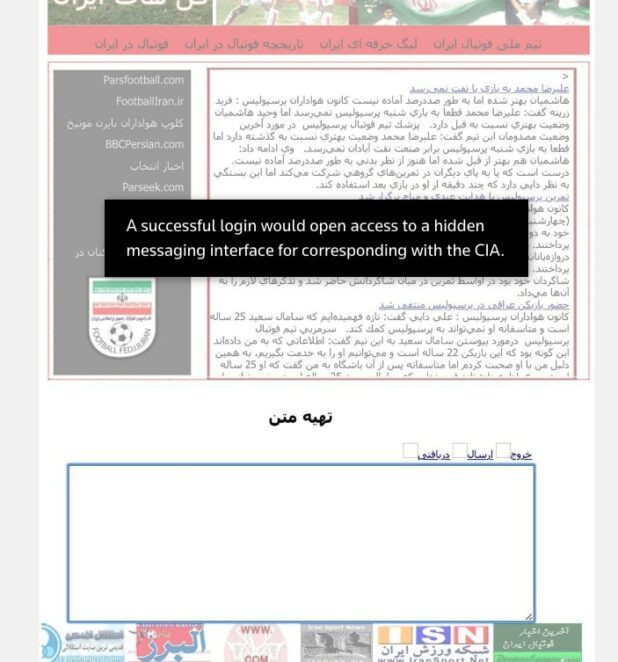We interviewed six Iranians who had worked with the CIA as spies and informants and got caught. A Reuters investigation found CIA negligence likely led to their capture. https://t.co/r7FdkkxSF4
— Joel Schectman (@joel_schectman) September 29, 2022
2/ One spy recounted receiving the covert messaging system first reported by @JennaMC_Laugh & @zachsdorfman. We found his soccer news site in an internet archive and asked two cyberanalysts review the system. @bozorgmehr pic.twitter.com/fjLu0OqW12
— Joel Schectman (@joel_schectman) September 29, 2022
3/ @billmarczak & @thezedwards easily discovered the messaging element and links to hundreds of other CIA sites, which had been easy for the Iranians. pic.twitter.com/qfObV5qTTm
— Joel Schectman (@joel_schectman) September 29, 2022
4/ Reuters found that the system wasn’t given to full-fledged high-valued assets but to lower level sources, or “developmentals”, who the CIA viewed “as not worth the investment of advanced tradecraft,” one former CIA officer told me. @bozorgmehr
— Joel Schectman (@joel_schectman) September 29, 2022
We found the CIA uses the visa process in consulates/embassies to pressure Iranians into providing info. One source described being asked to come to the embassy in UAE for repeated visa interviews in which he was pressured for military data. Iran found out and he went to jail. pic.twitter.com/rsDjUb9vzI
— Joel Schectman (@joel_schectman) September 29, 2022
6/ CIA goes to “hell and back” to protect its high-level sources. But Reuters found that when it comes to lower-level informants like the guys we talked to- “non-registered sources”- CIA does little to protect them and often does nothing to help if they get caught.
— Joel Schectman (@joel_schectman) September 29, 2022
7/ Even years after their release from jail for espionage these men continue to hope the United States will do something to compensate for the grave price they paid to help America. Some of them have become refugees, others live in Iran in daily fear of rearrest.
— Joel Schectman (@joel_schectman) September 29, 2022
Where do people get the idea that helping a foreign intelligence agency will benefit them personally? I can understand if you’ve been blackmailed, but otherwise, why would anyone get involved in something like this?
The CIA probably offers a lot of money – but do they actually pay out?
The spy was minutes from leaving Iran when he was nabbed.
Gholamreza Hosseini was at Imam Khomeini Airport in Tehran in late 2010, preparing for a flight to Bangkok. There, the Iranian industrial engineer would meet his Central Intelligence Agency handlers. But before he could pay his exit tax to leave the country, the airport ATM machine rejected his card as invalid. Moments later, a security officer asked to see Hosseini’s passport before escorting him away.
Hosseini said he was brought to an empty VIP lounge and told to sit on a couch that had been turned to face a wall. Left alone for a dizzying few moments and not seeing any security cameras, Hosseini thrust his hand into his trouser pocket, fishing out a memory card full of state secrets that could now get him hanged. He shoved the card into his mouth, chewed it to pieces and swallowed.
Not long after, Ministry of Intelligence agents entered the room and the interrogation began, punctuated by beatings, Hosseini recounted. His denials and the destruction of the data were worthless; they seemed to know everything already. But how?
“These are things I never told anyone in the world,” Hosseini told Reuters. As his mind raced, Hosseini even wondered whether the CIA itself had sold him out.
Gholamreza Hosseini
Rather than betrayal, Hosseini was the victim of CIA negligence, a year-long Reuters investigation into the agency’s handling of its informants found. A faulty CIA covert communications system made it easy for Iranian intelligence to identify and capture him. Jailed for nearly a decade and speaking out for the first time, Hosseini said he never heard from the agency again, even after he was released in 2019.
The CIA declined to comment on Hosseini’s account.
Hosseini’s experience of sloppy handling and abandonment was not unique. In interviews with six Iranian former CIA informants, Reuters found that the agency was careless in other ways amid its intense drive to gather intelligence in Iran, putting in peril those risking their lives to help the United States.
One informant said the CIA instructed him to make his information drops in Turkey at a location the agency knew was under surveillance by Iran. Another man, a former government worker who traveled to Abu Dhabi to seek a U.S. visa, claims a CIA officer there tried unsuccessfully to push him into spying for the United States, leading to his arrest when he returned to Iran.
Such aggressive steps by the CIA sometimes put average Iranians in danger with little prospect of gaining critical intelligence. When these men were caught, the agency provided no assistance to the informants or their families, even years later, the six Iranians said.
James Olson, former chief of CIA counterintelligence, said he was unaware of these specific cases. But he said any unnecessary compromise of sources by the agency would represent both a professional and ethical failure.
“If we’re careless, if we’re reckless and we’ve been penetrated, then shame on us,” Olson said. “If people paid the price of trusting us enough to share information and they paid a penalty, then we have failed morally.”
The men were jailed as part of an aggressive counterintelligence purge by Iran that began in 2009, a campaign partly enabled by a series of CIA blunders, according to news reports and three former U.S. national security officials. Tehran has claimed in state media reports that its mole hunt ultimately netted dozens of CIA informants.
To tell this story, Reuters conducted dozens of hours of interviews with the six Iranians who were convicted of espionage by their government between 2009 and 2015.
To vet their accounts, Reuters interviewed 10 former U.S. intelligence officials with knowledge of Iran operations; reviewed Iranian government records and news reports; and interviewed people who knew the spies.
None of the former or current U.S. officials who spoke with Reuters confirmed or disclosed the identities of any CIA sources.
The CIA declined to comment specifically on Reuters’ findings or on the intelligence agency’s operations in Iran. A spokeswoman said the CIA does its utmost to safeguard people who work with the agency.
Iran’s Ministry of Foreign Affairs and its Mission to the United Nations in New York did not respond to requests for comment.
Hosseini was the only one of the six men Reuters interviewed who said he was assigned the vulnerable messaging tool. But an analysis by two independent cybersecurity specialists found that the now-defunct covert online communication system that Hosseini used – located by Reuters in an internet archive – may have exposed at least 20 other Iranian spies and potentially hundreds of other informants operating in other countries around the world.
This messaging platform, which operated until 2013, was hidden within rudimentary news and hobby websites where spies could go to connect with the CIA. Reuters confirmed its existence with four former U.S. officials.
These failures continue to haunt the agency years later. In a series of internal cables last year, CIA leadership warned that it had lost most of its network of spies in Iran and that sloppy tradecraft continues to endanger the agency’s mission worldwide, the New York Times reported.
…
The six Iranians served prison terms ranging from five to 10 years. Four of them, including Hosseini, stayed in Iran after their release and remain vulnerable to rearrest. Two fled the country and have become stateless refugees.
The six men acknowledged that their CIA handlers never made firm promises to help if they were caught. Still, all had believed that U.S. assistance would one day come.
This also speaks to a fall in the prestige of the American intelligence services, frankly.
There is a time when they definitely would not have wanted a report about how they’re very incompetent and just abandon their informants and leave them to die published in Reuters.
Probably, these people have totally lost sight of whatever their mission was supposed to be.
 Daily Stormer The Most Censored Publication in History
Daily Stormer The Most Censored Publication in History
